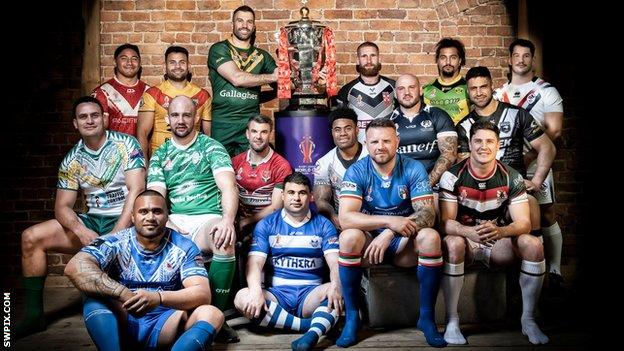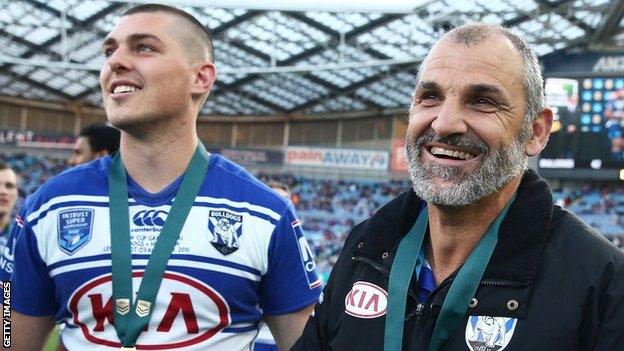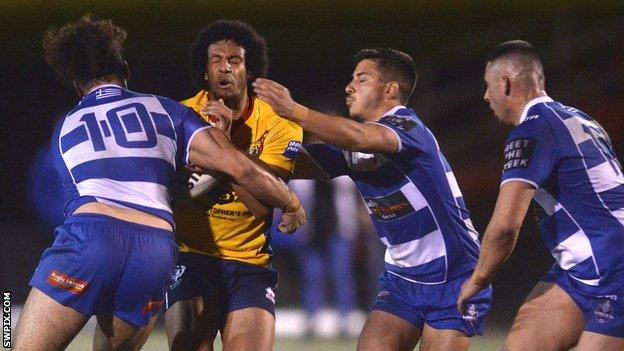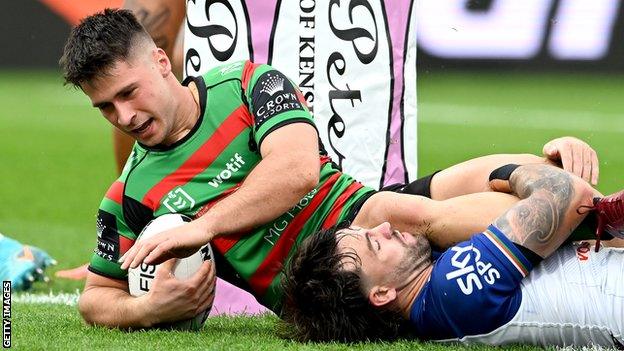Rugby League World Cup: Greece's incredible journey to World Cup debut
- Published

Jordan Meads (seated on floor, centre) joined the other 15 captains at the Rugby League World Cup launch in Manchester on 10 October
They played matches at midnight and in secret in the Athens mountains to avoid detection by police - Greece's journey to their first Rugby League World Cup was anything but straightforward.
It was only in August, almost three years after Greece qualified, that the Greek Rugby League Federation (GRLF) was recognised by the country's government as the independent governing body for rugby league there.
Before then, the team had been banned from playing matches on home soil for several years.
"One day they'll probably write a book about us," says captain Jordan Meads.
"It's been one heck of a journey, but we wouldn't have it any other way, and we take our hats off to other emerging nations that had to join us on that journey.
"We're a few months down the track of having rugby league as a legal entity within the country and, for us, we're keen to shed that victim mentality and see rugby league develop in a country that we know will respond really well to a sport like this."
Head coach Steve Georgallis has been at the forefront of the journey since Greece's first match in 2003.
Helping to grow rugby league in the country of his heritage has been motivated by wanting to give something back to his family; notably his father, who emigrated from Greece to Australia in the 1950s.
He confessed that he will be "quite emotional" when Greece walk out in Doncaster on Monday to make their World Cup debut against France.

Steve Georgallis (right) has held coaching positions with several NRL clubs in Australia
What happened?
In our conversation, Georgallis joked that it would take three weeks to tell the full story.
In 2016, the Rugby League European Federation (RLEF) voted to suspend the Hellenic Federation of Rugby League for "wilfully acting in a manner prejudicial to the interests of the overall governing body and international rugby league". It was later expelled.
The breakaway Greek Rugby League Association (GRLA, now the GRLF) was granted affiliate member status by the governing body of European rugby league early in 2018, allowing Greece to attempt to qualify for the World Cup.
Crucially though, the Hellenic Modern Pentathlon Federation was legally recognised as the controlling body of rugby league in Greece, not the GRLA.
Any rugby league played on Greek soil under the GRLA banner, by domestic clubs or the RLEF-endorsed national team, was forbidden. There were even occasions when police arrived to halt matches.
Playing in secret

Greece (in blue and white) played a "home" World Cup qualifier against Scotland in London in November 2019
Against this most unusual of backdrops, Georgallis and his players were trying to reach the World Cup.
One of the strangest moments came in 2018 when Malta arrived in Greece for a qualifier. Neither team knew where it would take place, while a Greek team official posted a picture on social media from an alternative venue to try to throw police off the scent.
New Zealand-born Meads, whose mother is Greek, said: "That was our one and only qualification game in Athens, and I think because of the rigmarole of the events that took place, we moved all of our 'home' games to London.
"I can vividly remember getting up and we had absolutely no idea where we were going to play.
"They literally said 'get on the bus, we're going to take you somewhere and you're going to play 80 minutes of football, and hopefully get one step closer to qualifying for a World Cup'.
"An hour and a half later, we arrived at this amazing field in the middle of the Athens mountains somewhere, far away from all prying eyes.
"We managed to put in a really good performance that day because we knew what it meant to play rugby league on our home soil."
Greece progressed to the final qualifying phase and although they were beaten by Scotland in a match staged at the New River Stadium, London, a thrashing of Serbia in Belgrade confirmed their World Cup spot.
The 'relief' of recognition
However Greece perform at the World Cup, they will leave England knowing that the future of rugby league at home should be a much brighter one.
More teams at grassroots level, promotion for training sessions and matches, financial support and integration into schools are all anticipated following government recognition of the GRLF.
With the parameters for becoming an independent federation met, including the requirement for at least 20 domestic clubs to be registered, Georgallis had a simple emotion when confirmation came through.
"Relief. So much relief," he said.
"It was just a relief to think 'wow', we've finally achieved what we wanted to achieve. To get here - and be in the World Cup - it's just amazing."

Lachlan Ilias, a regular starter for South Sydney Rabbitohs during the 2022 NRL season, is the headline inclusion in Greece's 24-man squad
Greece have drawn on players from far and wide for their World Cup debut.
South Sydney Rabbitohs half-back Lachlan Ilias is the star attraction in their 24-man squad and, along with a few others based with NRL clubs, he will feature alongside players from the lower grades in Australia, England's second-tier Championship and several players from Greece's domestic competition.
Greece, who will play England, Samoa and first opponents France in Group A, are anything between 500-1 and 2,500-1 outsiders to win the World Cup.
Asked about expectations for the tournament, Georgallis answered: "To be competitive.
"It's going to be tough but I think the fighting spirit we've shown for the past 10 to 15 years to try to get rugby league in Greece, you'll see it in our games.
"If we're competitive, you never know. Funnier things have happened. The Greek soccer team won the European Championship in 2004 so who knows?"